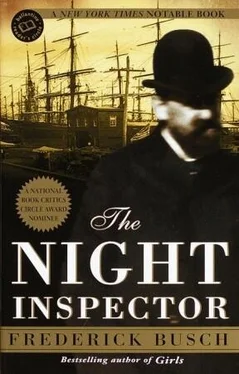He poured brandy into each glass, a good deal more than a splash, and he delivered mine with a kind of hop, and skip, and jump.
“To your health,” I ventured.
“Ah, Bill,” he said, “to yours, and to that of the warriors you knew. To the souls of the generals who bade you ride into battle.”
“To the souls of the dead,” I said. “To the dead. To those we killed.”
“And to Malcolm, dear fellow, who has insisted upon joining the National Guard. My son,” he told me, “Malcolm, my son. He works at an infernal insurance firm, gambling, I think I can say, on early deaths. But he awaits military work, not to say martial. Poor fellow, and he hasn’t even a gun. I must help him acquire one. They are expensive?”
I thought of the roisterer at Mrs. Hess’s, the all-but-boy they called Mal, who drank himself stupid and who brayed in the parlor. Something further might come of that masquerade. “I know of one,” I said.
“A reliable weapon? If he must go armed, he must be well-armed.”
“The Navy Colt of 1860 is a fine sidearm for combat. Your boy has large hands—”
“He has? How do you know his hands?”
“No, sir. You misheard me. I ask: Has he sizable hands?”
“He’s a well-proportioned fellow. Yes, I’d say.”
“It’s a well-balanced piece. The chambering device revolves, you see, and a cartridge is presented for the hammer to fall upon and fire every time the trigger is pulled. You must instruct him — they will, the Guard, of course — to not pull. You caress with increasing pressure. The weapon fires, and the next cartridge presents itself, ready to repeat. I carried it during the War. It’s far too large for a man in a business suit. The barrel’s intrusive on Broadway, though highly practical for defending yourself when there are a dozen yards and more between you and what endangers you. One. The shooter.”
“You are a marksman, then?”
“I was.”
“And you would part with this weapon?”
“As a service to my friend, I would. I keep Colt’s caliber.31 within reach for practical matters.”
“Practical matters. Well, what’s more practical, I say, than matters of life and death?”
“Nothing but business,” I said. “Malcolm, eh?”
“An industrious boy. Though he has been attracted by the demimonde, I fear. There are signs.”
“The smell of drink and strong tobacco? Women’s perfume? A certain pastiness of the visage, a glazing of the eye?”
M sat back. He shook his head once, and then he contemplated his brandy. Looking up at last, he said, “Hardly.”
“Well, then,” I said, and I lifted the mask above the ruins of my mouth, and I drank, sighting along the inside lining to regard his inquisitive, acquisitive stare at the puckers into which I poured some drink. I pulled down the mask and said, “A cumbersome business, I fear.”
“Ah! war thy theft,” he said. I took it to be more poetry.
We sat a long while, he now frowning and shaking his head.
At last I asked him, “Do you not regard the purchase of the Alaskan Territory for two cents an acre something of a great steal? The Russians must be hugely in need of capital to sell a half a million acres so small.”
He sighed. He roused himself enough to say, “Might I suggest that two cents for an acre of ice yields only an acre of ice? And you cannot bring it hither, you know. You must voyage forth for what will melt before you bring it home. I call that less than a bargain. I tend to never validate an estimation by anyone in the Department of State. I do not trust their judgment.”
“Skins,” I said. “Bear and otter. There are limitless skins.”
“I have my own, thanks, thin as it is.”
“And fishes of every sort, I understand.”
“No,” he said. “Surely not. I am through with fishes, little or large.”
“Secretary Seward cannot earn your approval, then.”
“I asked for his department’s approval, and friends not distant from the founts of power also asked, and this is the largesse I received. Day inspector, night inspector, badge and notebook, locks and pens. The distance from this barge to the consulship in Hawaii, which I requested, and which I dared to think I deserved, is greater than that between Hawaii itself and West Street. With a son soon gone for a Guardsman, and a wife almost gone in pursuit of surcease, and often enough — too often — a houseful of mouths.” Having refilled his glass, he said, “To feed. May I offer you more?”
“As I said, a cumbersome business.”
“Stand to, then, and signify as required.” He poured more brandy and drank it, clearly for the fire and not for the fiery taste.
“I will let you have that Colt at a lovely price,” I said.
“I shall consult with Lizzie — she is my wife. We shall discuss it, for any sum of money is a sum with which to be reckoned. And because I hope that we shall enjoy each other’s company soon again, I will predict the decision. I suspect it’s yes.”
“He’ll not go undefended.”
“I pray there’s no defense necessary. Though if he travels west, it’s the Indian wars, isn’t it?”
“From what I hear, the wars are ours, the lives lost are, in the majority, the Indians.”
“I would say, in the case of any other soldier,” he said, “that the persecutors of Indians receive their due. But I fear for him.”
“For anyone who soldiers, yes,” I said.
“Were you a horse soldier?” he asked me.
“I was a marksman.”
“Yes, of course.” He held up the glass to lay blame. “I saw a print of a marksman, by Mr. Winslow Homer, the magazine artist,” he said. “A fellow in a tree.”
“That was me. I was pretty then, wasn’t I?”
“That was you I saw!”
“Now, sir,” I said. “You have imprinted far more paper, far more valuably, than I. Mr. Homer was struck, apparently, by the sharpshooting profession — something to do, I’ve little doubt, with the visual apprehension of others when they might not know, perhaps. Something along those lines. He sketched me as I sat in a tree, far from any target, I can tell you. We were camped. We were gathering to disperse: It is how armies function. But, yes, I fired the 1859 Sharps rifle when it was time to conduct my business. I extinguished men.”
“Extinguished the light,” he said.
“If you will.”
I held my glass out, and he refilled it and then his own.
“You shot men from afar.”
“Often. But sometimes I worked in close.”
“And shot them down.”
“Dead. Yes.”
He shook his head.
“And then they wounded you.”
“They did.”
“A glory and a pity,” he said. “I wish I might have written a man such as you when I wrote tales. I wish I could do you justice.”
“Sir,” I said, “I wish I could see justice done for you.”
“I carry on. I write at an epic narrative in verse, Bill. About the Holy Land. About certain men whom I have known. It’s something of a summing-up.”
“The Holy Land’s an epic subject,” I said, although I’d no idea what it was I had said.
“A bitter place,” he said.
And I said, “Sir? Are you truly not bitter?”
“I can tell you,” he said, drinking his brandy off, “that I am not sweet.”
And then he was climbing the stairs in his house on East Twenty-sixth Street. And then he was inside the shadows of the lamp he carried up — inside of the shadows: his description. Stroking his beard, laughing his soundless laugh and meaning no laughter, squinting because he could not see so very far with any strength, and telling me of his evenings and his Sabbath afternoons in the little room upstairs that looked out upon a waste ground, a little backyard in which not even grass grew, and over the hard-packed, barren earth of which an accumulation of newspaper sheets and bits of rag and blown grit became a substitute, in his failing sight and in his inner vision, for the earth itself. He thought it the Manhattan aspect of the Dead Sea. In the harsh vinegar smell of Lizzie’s preserving of vegetables and fruit, and in the heavy, bland steam of her cookery, and in the sooty shadows of his lamp, and in the last silent room left to his claim, and to his lock, he wrote of the Holy Land, he corresponded intermittently with family and an occasional literary friend, though he knew that several had remarked to one another on the matter of his early death. A dead man needn’t hurry his long poem. Nor need an abortion to concern himself with matters of life. And since, as Mr. Charles Eliot Norton had remarked, his Battle-Pieces on the War were anything but poetry, his obligations to verse in general, and the literary world in particular, had disappeared. He drank at times, he wrote, he wrote and drank a bit, and Lizzie brought his meal to his door of an afternoon or evening. And he strolled down through the city to the docks, or rode the new horse-drawn streetcars to Union Square, where he could ride down further on an omnibus, or walk at a healthy pace. And then he was the deputy inspector, of the night or of the day, and he saw to the legal unloading of cargoes, the legal entrance by travelers to the crowded parlor of the United States — as he saw Manhattan — and he bore the badge of national service on the left-hand collar of his greasy suit.
Читать дальше












